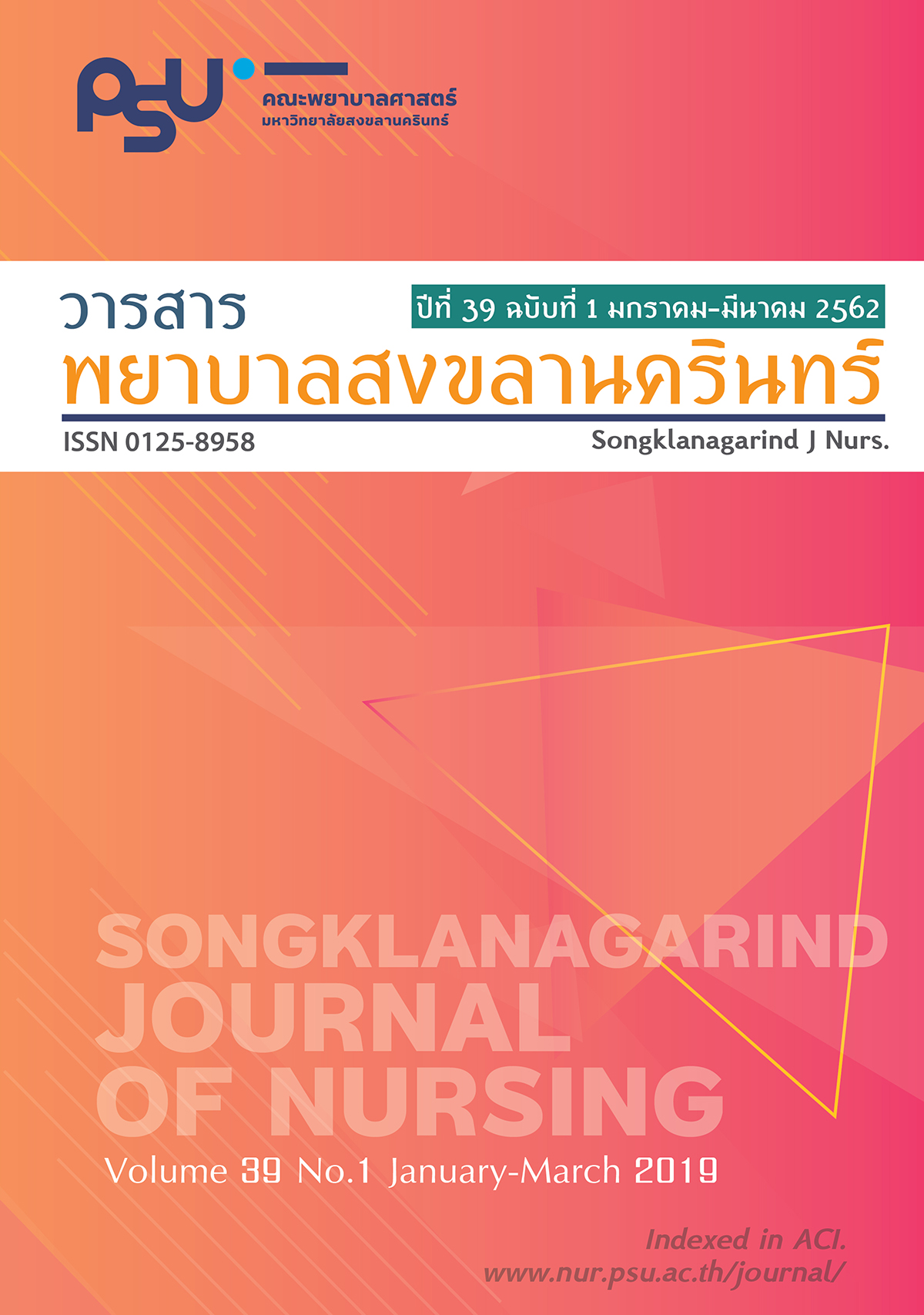Turning Point: Transitional Stage of Adolescent Mothers Returning to Education
Main Article Content
Abstract
This descriptive qualitative study aimed to explore the turning point of first-time Thai adolescent mothers who returned to education after motherhood. The participants were 20 adolescent mothers with a healthy baby aged no more than two years. Each of them had undergone the experience of childrearing after giving birth and studying in non-formal education simultaneously. In-depth interviews were used for data collection. The data were analyzed using content analysis method.
“Fulfilling personal life-goals” and “fulfilling parents’ wishes” were the findings of this study. The adolescent mothers decided to return to education during childrearing in order to achieve life-long success for themselves. The results can be used as evidence for nurses to inform, advise, and support pregnant adolescents and adolescent mothers to continue their education. Also, it can be used to guide social policy to promote all educational systems to enable these groups to gain long-term success in the future.
Article Details
References
Bureau of Reproductive Health, Ministry of Public Health. The situation of reproductive health in adolescents and youths 2016 [Internet]. [cited 2018 May 20]. Available from: http://rh. anamai.moph.go.th/download/all_file/index/ RH@2559.pdf
Bureau of Policy and Strategy, Ministry of Public Health. Summary of vital statistics 2013 [Internet]. [cited 2018 April 10]. Available from: http://bps.moph.go.th/new_bps/sites/default/ files/statistical2556.pdf
Sukrat B. Adolescent pregnancy: Policy, guidelines, and monitoring & evaluation. 2nd ed. Nonthaburi: Ministry of Public Health; 2014.
UNFPA Thailand. Motherhood in childhood: Facing the challenge of adolescent pregnancy. Bangkok: Success Publication; 2013.
Muangpin S, Tiansawad S, Kantaruksa K, et al. Northeastern Thai adolescents’ perceptions of being unmarried and pregnant. Pacific Rim Int J Nurs Res. 2010; 14(2): 149-61.
Neamsakul W. Unintended Thai adolescent pregnancy: A grounded theory study [dissertation]. [San Francisco]: University of California; 2008. 318 p.
Teen Pregnancy in Thailand, In Birth Control, Pregnancy Termination and Abortions in Thailand [Internet]. Bangkok: Thailand for You [cited 2018 Apr 10]. Available from: http://www.th4u. com/abortions.htm
Thai Health 2010. “Teenage mothers”: A big issue being prevented and solved in a limited way [homepage on the Internet]. Bangkok: Health Information System Development Office; 2010. Available from: www.hiso.or.th/hiso/picture/ report Health/Thai Health2010/eng2010_20.pdf
Laeheem K, Suwansuntorn P. The social effects on pregnant teenagers in Na Mom district, Songkhla Province. ND J. 2015; 55(1): 130-52. Thai.
DeVito J. How adolescent mothers feel about becoming a parent. J Perinat Educ. 2010; 19(2): 25-34.
Luong M. Life after teenage motherhood. Perspect Lab Income. 2008; 9(5): 5-13.
Seamark CJ, Lings P. Positive experiences of teenage motherhood: A qualitative study. Br J Gen Pract. 2004; 54(508): 813-18. Thai.
SmithBattle L. “I wanna have a good future”: Teen mothers’ rise in educational aspirations, competing demands, and limited school support. Youth Soc. 2007; 38(3): 348-71.
Thitimapong B, Kruehaew J, Yongwanichsetha S. Experience of adolescent mothers with childrearing and studying in non-formal education. Songkla- nagarind J Nurs. 2017; 37(3): 37-47.
Hsieh HF, Shannon SE. Three approaches to qualitative content analysis. Qual Health Res. 2005; 15(9): 1277-88.
Miles M, Huberman M, Saldana J. Qualitative data analysis: A methods sourcebook. 3rd ed. Thousand Oaks, CA: Sage; 2014.
Shaningwa LM. The educationally related challenges faced by teenage mothers on returning to school: A Namibian case study [master’s thesis]. [Rhodes University]: Rhodes University; 2007. 123 p.
Spear HJ. Personal narratives of adolescent mothers-to-be: Contraception, decision making, and future expectations. Public Health Nurs. 2004; 21(4): 338-46.
Teenage parents and their educational attainment [Internet]. Texas: Texas Comprehensive Center; 2011 [cited 2018 Apr 20]. Available from: http:// www.sedl.org/txcc/resources/briefs/number5/ bp_childcare.pdf
Sa-ngiamsak P. The life experiences of un- married teenage mothers in Thailand [dissertation]. [Queensland]: The University of Queensland; 2016. 185 p.
Heim KM. Creating a Future: Understanding young motherhood [master’s thesis]. [Canada]: Royal Roads University; 2009. 108 p.
Darvill R, Skirton H, Farrand P. Psychological factors that impact on women’s experiences of first-time motherhood: A qualitative study of the transition. J Midwifery. 2010; 26(3): 357-66.
Ngai FW, Chan SW, Holroyd E. Chinese primiparous women’s experiences of early motherhood: Factors affecting maternal role competence. J Clin Nurs. 2011; 20(9-10): 1481-89.
Thitimapong B, Keawpimon P, Kritcharoen S, et al. Maternal-infant attachment and postpartum adaptation to motherhood of the first-time adolescent mothers. Songkla Med J. 2010; 28 (4): 179-90. Thai.
Pungbangkadee R, Parisunyakul S, Kantaruksa K, et al. Experiences of early motherhood among Thai adolescents: Perceiving conflict between needs as a mother and an adolescent. Thai J Nurs Res. 2008; 12(1): 70-82. Thai.

